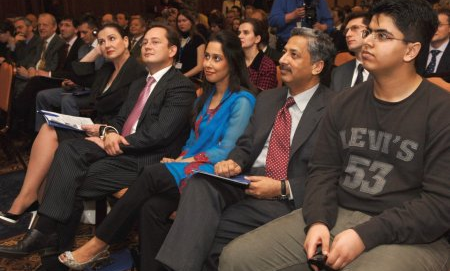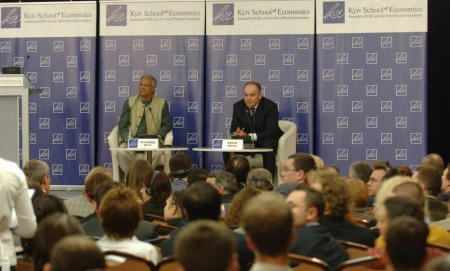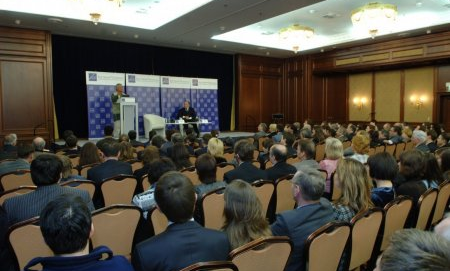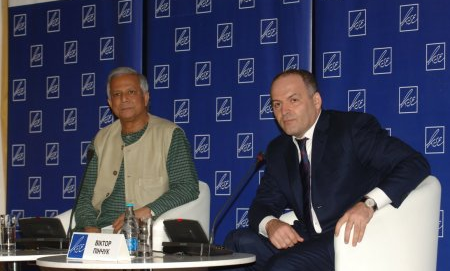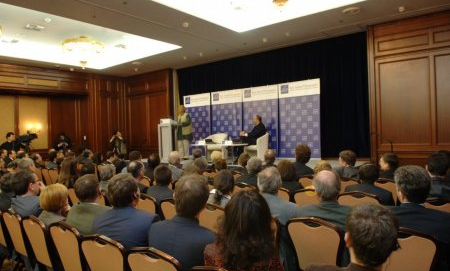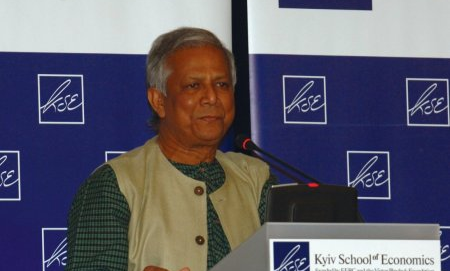Kyiv School of Economics: NEWS
Ukraine may possibly join the first class
 This Monday, Kyiv School of Economics (KSE) hosted a lecture delivered by the ninth president of the World Bank Group, James D. Wolfensohn, "UKRAINE IN FOUR SPEED WORLD", which was held within the framework of KSE Public Lectures project.
This Monday, Kyiv School of Economics (KSE) hosted a lecture delivered by the ninth president of the World Bank Group, James D. Wolfensohn, "UKRAINE IN FOUR SPEED WORLD", which was held within the framework of KSE Public Lectures project.
James Wolfensohn, who served two terms as president of the World Bank starting from 1995, delivered a lecture on a new theory of economic development of countries within next 50 years. He pointed out that the world economies could no longer be divided into poor and wealthy on the basis of economic indicators. Instead, depending on the annual GDP growth ratio all countries may be divided into four categories. According the former president of the World Bank: "A fast-moving globalization process that has accelerated within the last 20 years, has led to unprecedented level of development and integration. In the meantime, as the world is integrating more, it is also being divided into 4 categories with different levels of development and welfare. I call it the Four Speed World."
He believes that Ukraine falls into the second category of the Four Speed World and is sided by side by China, Indonesia, Malaysia and other countries whose GDP growth exceeds 3.5 percent per annum and their economies demonstrate positive GDP growth dynamics over the last decade. The first category includes mature economies, the third one includes the countries whose annual GDP growth amounts to less than 3.5%, and the forth one includes the countries with zero or negative GDP growth index.
The former World Bank president made a forecast whereby if the world's population reached 9 billion people within the next 50 years, "the world economy would be turned upside down" and 65% of the global GDP would be produced by emerging economies and only 35% by mature economies.
At the lecture, James Wolfensohn defined three major challenges that Ukraine was facing: sustained depopulation and aging of population (demographic challenge), low energy efficiency and outdated infrastructure (energy problem), and low quality of state institutions (legislative, financial, judicial) compared to the generally accepted standards (institutional challenge).
"The way the State is going to overcome these difficulties in a short or long-term basis will make it clear whether Ukraine is to end up in the third category joining the group of medium-income countries and those with declining level of economic development or will it become a consistent player capable of accessing the first category (mature economies)", - said the former World Bank president.
The lecture was attended by honorary chairman of KSE, Victor Pinchuk, co-chairmen of KSE Board of Directors, Anders Aslund (The Peterson Institute for International Economics), students of Kyiv School of Economics (KSE), representatives of investment companies, Ukrainian businessmen, and politicians.
After the lecture delivered by the former president of the World Bank, Victor Pinchuk pointed out: "One of the evidences of a genius is when a person can speak in simple and clear terms about very complicated and global things. Mr. Wolfensohn was at the head of the World Bank for 10 years and this is the main institution that monitors and works to influence the global economy. He knows a good thing about it better than the rest put together. Moreover, he speaks very simply - countries fall into 4 classes and the first class is the highest one. Ukraine is in the second one. So, if you do this and that you will have a chance to remain in the second one or even move to join the first one! If you do not do this, you'll join the third class. Everything is very simple and clear.
The KSE Public Lectures are organized on a regular basis by the Kyiv School of Economics for Ukraine's political and business community, inviting world-known scientists, economists, politicians and public figures to Ukraine. The goal of these events is to enlarge the economic debates on the topics most relevant for Ukraine and the world at large. The first conference took place on October 18 2006 with Dr. Francis Fukuyama and Nobel Prize Winner Dr. Robert Engle. The second conference, on January 26 2007, was about the economic future of space exploration. US astronaut of Ukrainian origins Heide Stefanyshyn-Pipper was among the key-speakers. Another lection held recently was "Contemporary economics and its application" by Dr. Robert Pindyck.











